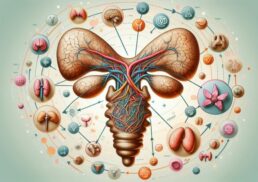Are you tired of dealing with digestive issues and searching for a way to improve your gut health? Look no further! In this blog post, we’ll explore the power of digestive enzymes, their benefits, natural sources, and supplements. By the end, you’ll have a better understanding of how to unleash the potential of these essential proteins to support your digestive health.
Table of Contents
Key Takeaways
Digestive enzymes are essential proteins for breaking down food and absorbing nutrients, but deficiencies can lead to malabsorption.
Certain foods contain natural digestive enzymes that support gut health, while supplements may be used to treat enzyme deficiencies.
Maintaining a balanced diet along with hydration and exercise is the best way to boost digestion naturally.
Understanding Digestive Enzymes
Digestive enzymes, proteins produced by organs like the pancreas, small intestine, and salivary glands, facilitate nutrient absorption from food. They play a vital role in gut health maintenance, malnutrition prevention, and avoidance of gastrointestinal issues. Their support for the digestive process enables our bodies to extract necessary nutrients from food.
Unfortunately, some individuals may not produce enough digestive enzymes due to genetic factors or medical conditions, leading to digestive enzyme deficiencies. These deficiencies can manifest as malnutrition and gastrointestinal discomfort, caused by the inability to break down fatty acids and other nutrients properly. In such cases, enzyme supplements can be beneficial for improving digestion and nutrient absorption.
What are Digestive Enzymes?
The proper breakdown of macronutrients such as carbohydrates, proteins, and fats is facilitated by digestive enzymes, which are crucial for our health. It is important to note that enzymes are proteins, and they play a significant role in the digestion process. The main digestive enzymes involved in this process are:
Proteases: Convert proteins into amino acids
Digestive enzyme lipase: Convert fats into fatty acids
Amylase: Convert carbohydrates into sugars
Maltase: Convert maltose into glucose
Sucrase: Convert sucrose into glucose and fructose
These pancreatic enzymes are mainly produced by the pancreas and are instrumental in ensuring that our bodies can absorb the needed nutrients from food.
Aside from the enzymes produced by our bodies, we can also find natural sources of digestive enzymes in certain fruits and fermented foods. By incorporating these enzyme-rich foods into our diet, we can improve digestion and promote overall gut health.
The Role of Digestive Enzymes
Digestive enzymes play a crucial role in maintaining overall gut health, including the digestive tract, and preventing malnutrition and gastrointestinal issues. They help break down food into smaller molecules for absorption and support the body’s essential metabolic processes.
Unfortunately, some people may suffer from exocrine pancreatic insufficiency (EPI), a condition in which the pancreas does not produce sufficient digestive enzymes. This can lead to difficulty in breaking down food, particularly fats, and result in malabsorption and malnutrition.
Addressing these deficiencies and supporting gut health necessitates a diet rich in natural digestive enzymes. Luckily, numerous fruits and fermented foods serve as excellent sources of these beneficial enzymes, providing the necessary support for our bodies’ optimal functioning.
Common Digestive Enzyme Deficiencies

Some individuals may experience digestive enzyme deficiencies due to genetic factors or medical conditions, leading to digestive problems. Two common deficiencies are lactose intolerance, caused by insufficient lactase production, and exocrine pancreatic insufficiency (EPI), a condition where the pancreas does not produce enough digestive enzymes.
The subsequent sections delve into a detailed exploration of these deficiencies and discuss potential remedies for improved digestion and gut health.
Lactose Intolerance
Lactose intolerance is a common digestive enzyme deficiency caused by insufficient lactase production, resulting in difficulty digesting lactose found in dairy products. This condition can be caused by a genetic predisposition, illness, injury, or surgery, or it may be present from birth due to a lack of lactase production. Individuals with lactose intolerance may experience stomach pain, bloating, and other gastrointestinal symptoms when consuming dairy products.
Thankfully, there are lactase supplements available that can help those with lactose intolerance better tolerate dairy products. Additionally, cheese and yogurt are generally more easily digestible than fresh milk, offering suitable alternatives for lactose-intolerant individuals.
Exocrine Pancreatic Insufficiency (EPI)
EPI is a condition where the pancreas does not produce enough digestive enzymes, leading to malabsorption and malnutrition. This deficiency is associated with health conditions that affect the pancreas, such as chronic pancreatitis, cystic fibrosis, and pancreatic cancer. Symptoms of EPI include abdominal pain, bloating, diarrhea, weight loss, and malnutrition.
Treatment for EPI can include dietary modifications, enzyme replacement therapy, and pancreatic enzyme supplements. By addressing the root cause of the deficiency and providing the necessary support for digestion, individuals with EPI can improve their nutrient absorption and overall gut health.
Natural Sources of Digestive Enzymes

Natural sources of naturally occurring digestive enzymes can be found in various fruits and fermented foods, which can help improve digestion and gut health. These foods not only provide an abundance of essential enzymes but also offer a wealth of other nutrients that support overall health and well-being.
Next, we examine these enzyme-rich foods and their benefits in greater detail.
Fruits
Fruits like pineapple, papaya, and mango contain digestive enzymes that aid in breaking down proteins and carbohydrates. For example, pineapple is rich in bromelain, a group of enzymes that facilitate the breakdown of proteins into amino acids, thereby aiding in digestion and absorption of proteins. Papayas are also beneficial for digestion, as they contain the enzyme papain, which helps break down proteins and has been suggested to relieve digestive symptoms of IBS, including constipation and bloating.
For the full benefits of these fruits, consume them in their raw, unprocessed form as heat exposure may hinder the effectiveness of their digestive enzymes. Including these enzyme-rich fruits in your diet can enhance digestion and overall gut health.
Fermented Foods
Fermented foods such as kefir, sauerkraut, and kimchi are rich in digestive enzymes and probiotics that support a healthy gut. The fermentation process not only produces beneficial enzymes but also creates an environment where beneficial bacteria can thrive, promoting a balanced gut microbiome.
Incorporating these fermented foods into your diet can provide a wealth of benefits for your digestive health. Some of the benefits include:
Supplying essential enzymes and probiotics
Offering a variety of nutrients
Supporting overall well-being
Enhancing digestion
Fostering a healthier gut
Inclusion of these foods in your meals can help you experience these benefits.
Digestive Enzyme Supplements: Types and Usage
Digestive enzyme supplements are available in both OTC and prescription forms to help individuals with enzyme deficiencies or those looking to improve digestion. These supplements provide a concentrated source of enzymes that can facilitate the breakdown of macronutrients, such as fats, proteins, and carbohydrates, thus improving the overall digestive process.
While natural sources of digestive enzymes are undoubtedly beneficial, some people may require additional support in the form of supplements. The subsequent sections will examine the various types of digestive enzyme supplements available and discuss their uses and benefits.
Over-the-Counter (OTC) Supplements
OTC digestive enzyme supplements can help with lactose intolerance and other mild digestive issues but are not regulated by the FDA. These supplements typically contain plant-based enzymes and can address issues such as:
Acid reflux
Gas
Bloating
Diarrhea
However, it’s essential to be aware of the potential risks associated with OTC supplements, as their dosage, ingredients, and enzyme concentration are not guaranteed, and their side effects are unknown.
Prior to starting any OTC digestive enzyme supplement, consultation with a healthcare provider is necessary to verify its safety and discuss potential interactions with other medications or supplements.
Prescription Supplements
Prescription digestive enzymes, also known as prescription digestive enzyme supplements, are used for conditions like EPI and are regulated by the FDA, ensuring quality and safety. These supplements, such as pancrelipase, are typically part of pancreatic enzyme replacement therapy (PERT) and are prescribed for individuals with cystic fibrosis, recurrent pancreatitis, or other pancreatic disorders.
Always seek advice from a healthcare provider before starting any prescription digestive enzyme supplement. This will ensure the correct dosage and prevent potential side effects or interactions. A collaborative approach with your healthcare provider can help you find the right supplement to address your specific needs and enhance your digestion and nutrient absorption.
Choosing the Right Digestive Enzyme Supplement

When choosing a digestive enzyme supplement, it’s essential to consider the quality, ingredients, and consult with a healthcare provider for guidance.
By evaluating these factors and discussing your options with a medical professional, you can select the supplement that best suits your individual needs and preferences.
Quality and Ingredients
When selecting a digestive enzyme supplement, look for reputable brands, check ingredients, and seek seals of approval from organizations such as the US Pharmacopeia (USP) or NSF International. Be cautious of supplements that make unsubstantiated claims, as they may not provide the desired benefits or could even cause harm.
In addition to considering the brand and ingredients, it’s also important to examine the specific enzymes included in the supplement, such as bromelain, papain, and amylase. By carefully evaluating the quality and ingredients of a supplement, you can make an informed decision and choose the right product to support your digestive health.
Consultation with Healthcare Provider
Before starting any digestive enzyme supplement, consultation with a healthcare provider is necessary to ensure the correct dosage and avoid potential side effects. Your healthcare provider can give personalized advice to help you choose the digestive enzyme supplement that is best suited to your individual needs and preferences.
In addition to discussing the potential benefits and risks of taking digestive enzyme supplements, you should also inquire about:
Any potential interactions with other medications or supplements you are currently taking
The recommended dosage
Any alternative treatments or therapies that may be beneficial.
By seeking professional guidance, you can make an informed decision and find the best supplement to support your digestive health.
Potential Side Effects and Interactions
Although digestive enzyme supplements can offer significant benefits, it’s important to be aware of potential side effects and interactions. Some individuals may experience:
Nausea
Vomiting
Diarrhea
Abdominal pain
as a result of taking these supplements. Additionally, certain enzymes, such as bromelain, can interact with medications like amoxicillin, anticoagulants, and antiplatelet drugs.
To ensure the safe use of digestive enzyme supplements and minimize risks, it’s advisable to consult with a healthcare provider before starting any supplement regimen. They can offer personalized guidance and assist you in choosing the right supplement to address your specific needs and preferences.
For more info, visit Digestive Enzymes: Side Effects, Uses, Dosage …
Boosting Digestive Health Naturally
In addition to utilizing digestive enzyme supplements, boosting digestive health naturally involves maintaining a balanced diet, staying hydrated, and engaging in regular exercise.
By incorporating these healthy habits into your daily routine, you can support overall gut health and enjoy the benefits of improved digestion and the ability to absorb nutrients more effectively.
Balanced Diet
Consuming a well-balanced diet rich in fruits, vegetables, lean proteins, and whole grains can help improve digestion and prevent gastrointestinal issues. By providing essential nutrients and supporting the function of digestive enzymes, a balanced diet can promote optimal gut health and overall well-being.
In addition to incorporating nutrient-dense foods, it’s also important to avoid highly processed, fatty foods, particularly fried foods, which can cause gastrointestinal irritation and inhibit digestion. By making mindful choices and prioritizing whole, nutrient-rich foods, you can support a healthy digestive system and enjoy the benefits of improved gut health.
Hydration and Exercise
Staying hydrated and engaging in regular exercise can promote healthy digestion and overall gut health. Adequate hydration helps the digestive system function properly and eliminates toxins, while exercise encourages regular bowel movements and supports a healthy body shape.
To ensure you stay hydrated and exercise safely, aim to drink an adequate amount of water throughout the day and engage in regular physical activity that is appropriate for your fitness level. By prioritizing hydration and exercise, you can support a healthy digestive system and enjoy improved overall health and well-being.
Summary
In conclusion, digestive enzymes play a vital role in maintaining gut health and ensuring optimal nutrient absorption. Whether you choose to incorporate natural sources of digestive enzymes, such as fruits and fermented foods, or opt for supplements to address specific deficiencies, it’s essential to consult with a healthcare provider to ensure you’re making the best choices for your individual needs. By maintaining a balanced diet, staying hydrated, and engaging in regular exercise, you can support overall gut health and enjoy the benefits of improved digestion and well-being.
Frequently Asked Questions
What are the benefits of taking digestive enzymes?
Digestive enzymes have numerous benefits, including reducing the symptoms of Irritable Bowel Syndrome, increasing nutrient absorption, increasing energy, preventing leakage from the gut, supporting a healthy inflammatory response, reducing chronic fatigue and pain, supporting methylation, and combating anxiety.
What are signs you need digestive enzymes?
Signs you need digestive enzymes include abdominal pain, bloating, diarrhea, gas, oily stools, and weight loss.
Is there a downside to taking digestive enzymes?
Digestive enzyme supplements can cause side effects such as allergic reactions, interactions with medications and abdominal pain. Severe effects are rare and depend on the type of supplement used.
When should you take digestive enzymes?
For the best results, digestive enzyme supplements should be taken 15-20 minutes prior to eating in combination with food. This ensures they will begin to work as soon as food hits your stomach and small intestine.
What are some natural sources of digestive enzymes?
Fruits such as papaya, pineapple and kiwi, as well as fermented foods like kefir, kimchi and sauerkraut are all natural sources of digestive enzymes.









